|
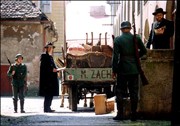 Winning Isn't Everything
Winning Isn't Everything
Jan Hřebejk's Musíme si pomáhat
Andrew James Horton
Conventional wisdom would have you believe that the 1990s was a disaster for Central and East European (CEE) cinema. True, the transition from state-controlled film-making took its toll on the number of films that were produced, but CEE films' performance at the Oscars has not been much different from in the 1970s or 1980s.
Among this year's five short-listed films for the coveted Academy Award for Best Foreign-Language Film is Jan Hřebejk's Musíme si pomáhat (Divided We Fall, 2000), the third Czech film to be nominated for the prize in a decade.
When the Second World War breaks out, three Czech friends find themselves divided: David as a Jew is  transported to the Thereseinstadt (Terezín) ghetto, a transfer station on the way to Auschwitz; Horst, as an ethnic German who resents the way Czechs have treated his background, finds it easy to get on in the Nazi party and Josef just wants to live a quiet life, enjoy his marriage to his beautiful wife, Marie, and survive the war. transported to the Thereseinstadt (Terezín) ghetto, a transfer station on the way to Auschwitz; Horst, as an ethnic German who resents the way Czechs have treated his background, finds it easy to get on in the Nazi party and Josef just wants to live a quiet life, enjoy his marriage to his beautiful wife, Marie, and survive the war.
He maintains his friendship with Horst, not so much out of ideological belief or even for the rare goods that the well-connected Nazi brings, but simply because it would be too difficult to break off from the relationship. Even the fact that Horst has taken an obvious fancy to his wife does not persuade Josef to tell his fascist friend where to go.
If Horst is a mild irritant to start with, he becomes a positive danger when he starts to realise that Josef has (with some initial reluctance) taken in David, who has somehow escaped from Poland and found his way back to his home town. Josef starts to realise that he can no longer take a neutral stance in the war.
Surprisingly, the slippery Horst is quite amenable to helping Josef cover up his guest. He persuades 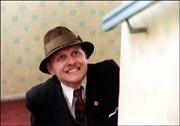 Josef that, to avoid suspicion and to get the extra food he needs to feed his friend, he must fit in with the Nazi regime and teaches him the correct blank facial expression he needs to become a German collaborator. Josef that, to avoid suspicion and to get the extra food he needs to feed his friend, he must fit in with the Nazi regime and teaches him the correct blank facial expression he needs to become a German collaborator.
Josef soon feels himself caught in an absurd trap, with both David and Horst seeming to want Marie's affection and himself unable to extract himself from the hole he has dug himself into. Not only that, but he finds he has lost his status in the Czech community and people cross the road to avoid him. As in any good farce, when things hit rock bottom they can only get worse, and Horst as revenge for a failed sexual assault on Marie insists that as well as hiding a fugitive Jew they should house a disgraced Kommandant of the town.
Marie puts her foot down and refuses to accommodate the German officer when he turns up at their door, explaining that they are shortly to have a baby. The ruse backfires when they realise that, firstly, the only way for the excuse to be totally convincing is if Marie does actually give birth and, secondly, that Josef is sterile.
A hasty arrangement with David is reached and Marie is soon pregnant. Horst is also humbled by the experience and realising the brute he has been taken significant risks to protect the couple. By the time nine months have passed, the war has come to a close and the Czechs are taking out their bitter anger on their occupiers and those who collaborated with them. When Josef tries to find medical help for his wife who is in labour, he finds that the harsh justice of the post-war system has come down against him and he has been branded a collaborator.
He just manages to convince the new authorities (under the command of the Czech resistance and the Russian army) that his wife needs help and is allowed to search a group of 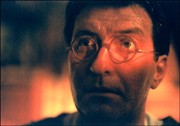 German prisoners to find the doctor who can help him, Dr Fischer. In view of his mass sterilisation of "gypsy trash," Fischer has committed suicide, and Josef instead acknowledges the help Horst has given him by pretending that the erstwhile thorn in his side is the doctor. German prisoners to find the doctor who can help him, Dr Fischer. In view of his mass sterilisation of "gypsy trash," Fischer has committed suicide, and Josef instead acknowledges the help Horst has given him by pretending that the erstwhile thorn in his side is the doctor.
In rescuing the man who, at one point, tried to rape his wife, Josef utilises the principle by which Horst has always worked: "musíme si pomáhat" (literally "we must help each other"). The ending is a happy one, David is evidence enough of Josef's innocence, and Josef takes on the role of a proud father with a renewed sense of life.
Return of the anti-hero
Musíme si pomáhat, therefore, taps into that age-old tradition in Czech film: the ordinary man who, to his surprise and even horror, finds himself cast in the unlikely role of the hero. Interestingly, this motif can be seen in all the Czech and Slovak Oscar winners. Hence, Tono Brtko in Obchod na korze (Shop on the High Street, 1965) accidentally finds himself harbouring a Jew in Nazified Slovakia, Miloš Hrma in Ostře sledované vlaky (Closely Observed Trains, 1966) is more concerned with losing his virginity than in joining the resistance and František Louka in Kolja (Kolya, 1996) finds lecherously chasing attractive young women to be far more pressing than the unwanted responsibilities of looking after his step-son.
With typical Central European sensitivity to the contradictions between the desire for personal happiness and wider historical events, Hřebejk presents 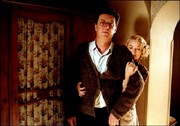 Josef as a character who has caught in the middle of something larger than he can control. In this respect, Hřebejk is not just drawing on Czech filmic traditions but also literary ones: Franz Kafka and Jaroslav Hašek being the obvious names that spring to mind. Josef as a character who has caught in the middle of something larger than he can control. In this respect, Hřebejk is not just drawing on Czech filmic traditions but also literary ones: Franz Kafka and Jaroslav Hašek being the obvious names that spring to mind.
Indeed, Hřebejk and Jarchovský go to every possible length to underline the unheroic nature of their hero. This is partly evident in making him impotent, disabled and a man who shits his pants in the face of danger, but more importantly in him being a collaborator and someone who takes a job confiscating Jewish property.
This is no small point. Czech films have traditionally taken a black-and-white view of the past. Even films with anti-heroes have relied on a division between those who collaborated (be it with the Nazis or the Communists) and those who didn't. The horribly indefinable grey-scale in between has largely been left untouched, despite the fact that historians have had trouble distinguishing between the innocent and the guilty in Czech history.
No pussy-footing
Musíme si pomáhat, however, is a film which seemingly tries to avoid historical niceties. Reflecting the moral ambiguities of the war, Hřebejk's hero has no choice but to collaborate in order to behave morally. Most Czech wartime films have presented the difference between those who collaborate with evil and those 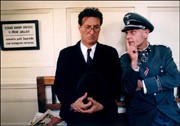 who don't as some distinction in genetics: some people are born good and some are born bad. Hřebejk, however, recognises that moral choices are based not only on personal fortitude or nationality by birth but also on circumstances, and ultimately his film is an admission that there is no heroic way to behave during a war. who don't as some distinction in genetics: some people are born good and some are born bad. Hřebejk, however, recognises that moral choices are based not only on personal fortitude or nationality by birth but also on circumstances, and ultimately his film is an admission that there is no heroic way to behave during a war.
The director shies away from complete espousal of the theory that some people are born bad in that certain of the Germans are shown as being intrinsically evil, particularly the sinister Dr Fischer and a raid by German officers on Josef's street in which a dog gets shot for barking too much. Nevertheless, Hřebejk's portrayal of the Czechs' moral standing is remarkable for its murkiness.
Czecho-German relations are still soured by both the wartime oppression of Czechs by Germans and the corresponding backlash from the Czechs that saw the murder, victimisation and the (internationally sanctioned) expulsion of the Sudeten Germans from Czech territory, the latter of which is now known in Czech as the odsun.
Czech historians in the Communist era played down the iniquity and brutality—even though similar backlashes were experienced in all the occupied countries—and it was to the regime's advantage to portray the odsun as a historically just process. For this reason, many Czechs, even today, downplay the brutality towards ethnic Germans who were native to Czech territory or even deny it. German attempts to reclaim land that was confiscated from them after the war have not met with Czech approval and, in many cases, have not been successful.
Uncomfortable truths in a comfortable way
Musíme si pomáhat, in this sense, is a ground-breaking film, in that it challenges Czechs, a nation that always likes to think of itself as a passive victim, to consider the actively inglorious aspect of its past.
Aside from the victimisation of the Jews—particularly David's harrowing description of his parents' death—Hřebejk portrays the German occupation as relatively peaceful, albeit a tense peace. Against this, the Czech uprising against those who collaborated with the Germans and those of German ethnic origin is seen as a outpouring of repressed energy possessing a primitivism that not even the German oppressors had. The animal quality of this revenge is contrasted with Josef's view of events, as he runs helplessly around the town trying to find a doctor to help his wife in labour.
Hřebejk is even prepared to portray Horst as a man whose adherence to Nazism has arisen as a result of being victimised for his ethnic background as a child—a dark hint that Czechoslovakia's behaviour towards Germany in the inter-war period may not have always taken the wisest and most diplomatic course for a country wishing to avoid war. Moreover, Horst insists that his home is Bohemia and is repelled by the his wife who wants to live in the Reich. For all his contradictions, Horst ultimately considers himself to be a Czech.
The moral quandary of Josef, who collaborates, is contrasted with a Czech member of the resistance who, in an early sequence in the film, rejects David's pleas for shelter and tries to hand him over to the Germans rather than risk his own skin. The same Czech is seen later in the film after the war's end as a local commander who is about to pass hasty judgement on those who were deemed to have sided with the Germans. He squirms uncomfortably at Josef's testimony as he recognises that while his record as a Czech patriot is cleaner than Josef's, morally Josef took the more righteous course.
This approach can also be seen in Hřebejk's previous film, Pelišky (Cosy Dens, 1998), in which the lunacy of a pro-Russian Communist general is seen as no more ridiculous than that of a hero of the pro-Western wartime resistance.
Just as Communists and patriots were all presented as being valid members of Czechoslovak society in Pelišky, Musíme si pomáhat stresses that Czechs, Germans and Jews are all integral members of the land that is now called the Czech Republic. Indeed, when Horst's credentials as a doctor are challenged and a Communist commander asks who he really is, it is the Czech resistance leader who, in full knowledge of Horst's ethnic background and his collaboration with the Nazis, says that he is "one of us."
The final scene of Josef, a Czech, walking through a landscape of ruin (and yet also distinctly of renewal and rebuilding) while pushing a pram containing a child with Jewish 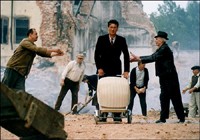 parentage brought into the world by a German is one of the strongest in the film, and one that has featured heavily on the film's publicity. parentage brought into the world by a German is one of the strongest in the film, and one that has featured heavily on the film's publicity.
The motif is a potent one for a nation emerging from the chaos of Communism at a loss at how to deal with the displaced German minority and the country's Roma. This is all the more pertinent to consider at a time when the Czech Republic's track record on racial tolerance is being closely followed by the European Commission as it assesses the republic's readiness for accession to the European Union.
It is an indicator of the film's success that it has been accepted by a national audience who are normally very sensitive to any form of historical criticism (although Hřebejk does soften the blow by blaming the worst excesses of the backlash against the German on the Czech Communists). Doubtless, the hard-hitting nature of his message is why Hřebejk finds light comedy such as useful vehicle. Using farce and slapstick, he is able to present an audience with issues that could not have been broached easily.
This is not to say that Musíme si pomáhat is the only film to have tackled the delicate issue of the odsun—Dušan Hanák's documentary Papierové hlavy (Paper Heads, 1995) is another interesting example—but it has certainly succeeded in bringing the subject into the public domain in a way that no other film has.
Some you win...
The tragedy is, of course, is that Musíme si pomáhat has very little chance of winning the Oscar for which it has been nominated. For all the merits it may have in the Czech historiographic context, it is an aesthetically uneven film and some might find the pantomime quality of certain scenes (and particularly the character of Horst) ruins the tense atmosphere. At times, Hřebejk seems to be a bit confused as to if he aiming at the tone of a serious drama with a blacky comic twist or a raucous piece of slapstick.
Worse still, up for the same award is Ang Lee's Wo hu zang long (Crouching Tiger Hidden Dragon, 2000). Not only is Ang Lee a known name in American cinema, with English-language hits such as Sense and Sensibility (1995) and The Ice Storm (1997) under his belt, but Wo hu zang long is nothing short of a box office phenomenon (and the Oscars have always been a recognition of bankability than anything else).
However, Wo hu zang long's success (it looks set to become the highest grossing foreign-language film of all time in the US and the UK) is a cause for celebration, and in this respect the film deserves its Oscar. The
film has succeeded in reaching across barriers and in persuading people who normally have a rabid phobia of films with subtitles that "foreign" films can indeed be enjoyable and have rewards that English-language cinema only rarely offers.
For this reason, Czech cinema can only gain at this year's Oscar ceremony. With subtitled cinema looking to become increasingly profitable in the English-speaking world, small national cinemas, such as the Czech one, can only gain, as distributors overcome once seemingly insurmountable prejudices and put more faith in marketing World Cinema.
Musíme si pomáhat may not get the revenue boost that an Oscar-win invariably brings. But at least the way will be paved for future Hřebejk films to achieve a more widespread international success.
Andrew James Horton, 5 March 2001
Also of interest:
Moving on:
|




 transported to the Thereseinstadt (Terezín) ghetto, a transfer station on the way to Auschwitz; Horst, as an ethnic German who resents the way Czechs have treated his background, finds it easy to get on in the Nazi party and Josef just wants to live a quiet life, enjoy his marriage to his beautiful wife, Marie, and survive the war.
transported to the Thereseinstadt (Terezín) ghetto, a transfer station on the way to Auschwitz; Horst, as an ethnic German who resents the way Czechs have treated his background, finds it easy to get on in the Nazi party and Josef just wants to live a quiet life, enjoy his marriage to his beautiful wife, Marie, and survive the war. Josef that, to avoid suspicion and to get the extra food he needs to feed his friend, he must fit in with the Nazi regime and teaches him the correct blank facial expression he needs to become a German collaborator.
Josef that, to avoid suspicion and to get the extra food he needs to feed his friend, he must fit in with the Nazi regime and teaches him the correct blank facial expression he needs to become a German collaborator. German prisoners to find the doctor who can help him, Dr Fischer. In view of his mass sterilisation of "gypsy trash," Fischer has committed suicide, and Josef instead acknowledges the help Horst has given him by pretending that the erstwhile thorn in his side is the doctor.
German prisoners to find the doctor who can help him, Dr Fischer. In view of his mass sterilisation of "gypsy trash," Fischer has committed suicide, and Josef instead acknowledges the help Horst has given him by pretending that the erstwhile thorn in his side is the doctor. Josef as a character who has caught in the middle of something larger than he can control. In this respect, Hřebejk is not just drawing on Czech filmic traditions but also literary ones: Franz Kafka and Jaroslav Hašek being the obvious names that spring to mind.
Josef as a character who has caught in the middle of something larger than he can control. In this respect, Hřebejk is not just drawing on Czech filmic traditions but also literary ones: Franz Kafka and Jaroslav Hašek being the obvious names that spring to mind. who don't as some distinction in genetics: some people are born good and some are born bad. Hřebejk, however, recognises that moral choices are based not only on personal fortitude or nationality by birth but also on circumstances, and ultimately his film is an admission that there is no heroic way to behave during a war.
who don't as some distinction in genetics: some people are born good and some are born bad. Hřebejk, however, recognises that moral choices are based not only on personal fortitude or nationality by birth but also on circumstances, and ultimately his film is an admission that there is no heroic way to behave during a war. parentage brought into the world by a German is one of the strongest in the film, and one that has featured heavily on the film's publicity.
parentage brought into the world by a German is one of the strongest in the film, and one that has featured heavily on the film's publicity.
